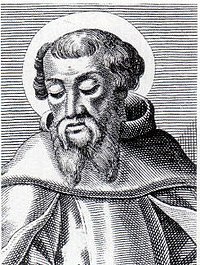Irenaeus of Lyons
| Saint Irenaeus | |
|---|---|

|
|
| Bishop and Martyr | |
| Born | AD 130 Smyrna in Asia Minor (modern-day İzmir, Turkey) |
| Died | AD 202 (aged 72) Lugdunum in Gaul (modern-day Lyons, France) |
| Venerated in |
Roman Catholic Church and Eastern Catholicism Assyrian Church of the East Eastern Orthodox Church Lutheran Church Oriental Orthodox Church Anglican Communion |
| Feast | June 28 (Roman Catholic Church, Anglican Communion); August 23 (Eastern Catholic, Orthodox and Oriental Churches) |
Irenaeus (/aɪrəˈniːəs/; Greek: Εἰρηναῖος) (early 2nd century – died c. AD 202), also referred to as Saint Irenaeus, was Bishop of Lugdunum in Gaul, then a part of the Roman Empire (now Lyon, France). He was an early Church Father and apologist, and his writings were formative in the early development of Christian theology. A resident of Smyrna, he heard the preaching of St. Polycarp, a disciple of St. John the Evangelist.
Irenaeus' best-known book, Adversus Haereses or Against Heresies (c. 180), is a detailed attack on Gnosticism, which he considered a serious threat to the Church, and especially on the system of the Gnostic Valentinus. As one of the first great Christian theologians, he emphasized the traditional elements in the Church, especially the episcopate, Scripture, and tradition. Against the Gnostics, who said that they possessed a secret oral tradition from Jesus himself, Irenaeus maintained that the bishops in different cities are known as far back as the Apostles and that the bishops provided the only safe guide to the interpretation of Scripture. His polemical work is credited for laying out the "orthodoxies of the Christian church, its faith, its preaching and the books that it held as sacred authority." His writings, with those of Clement and Ignatius, are taken as among the earliest signs of the doctrine of the primacy of the Roman see. Irenaeus is the earliest witness to recognition of the canonical character of all four gospels.
...
Wikipedia
